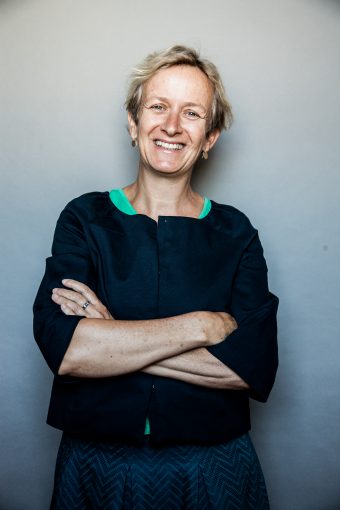On the last Sunday of July this year, a few hundred artists, academics, and thinkers gathered at Art & Action: Displacing Whiteness in the Arts. An event which marked the conclusion of a fortnight of select programming exploring themes of identity-politics, belonging, asylum seekers and human rights, and decolonisation.
It included local works, such as Powerhouse Youth Theatre’s Tribunal, an alternative judiciary on Australia’s treatment of asylum-seekers and indigenous Australians, Wani Le Frere‘s multidisciplinary poetic exploration of the African diaspora in Tales of an Afronaut, and We All Know What’s Happening, a satirical work on the treatment of asylum-seekers in Nauru, the brainchild of Samara Hersch and Lara Thoms.
International artists included South African performance artist, Sethembile Msezane in Excerpts from the Past, regarding the identity conflicts of Africa’s colonial history, and Respectable Thief, by Angolan-born Nastio Mosquito, an intense multidisciplinary experience acting as a clarion call to empowerment and agency as a cure for the disenchantment of contemporary society.
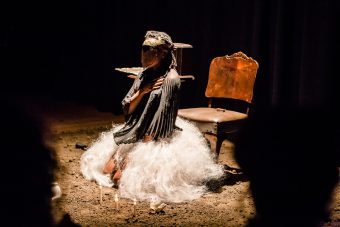
The program reflects an increasing recognition of cross-pollination between arts, activism, and the politics of power in contemporary Australia, and indeed the world. But, nowhere in the Arts House program was its recognition more evident, nor explicitly emphasised, than in the concluding event. Earnestly titled, and fraught with political sensitivities, Arts House Director, Angharad Wynne-Jones, says Art & Action: Displacing Whiteness in the Arts was a purposeful decision.
“One of the things we talk about at Arts House is the risk of not taking risks. So, in that way, maybe we do take more risks than we should with audiences. We’ve done lots of what would seem to be contentious, controversial, political work at Arts House as long it’s been around. It’s known for its experimentation, so that gives us, in some sense, permission to take on these agendas.”
According to Wynne-Jones, Arts House has been talking about place and displacement for some time, inspired by the work being proposed by artists, and through discussions within their creative team. She says Naomi Velaphi, one of the producers, is extremely knowledgeable in the themes of contemporary creative practice.
“She has African heritage herself, and naturally drew on artists with similar cultural backgrounds who she knew, and knew had been underrepresented in programs at Arts House. So the program evolved through a whole number of coincidences and confluences around the place and displaced premise.”
As the conversations shifted to decolonisation, Wynne-Jones noted an increasing urgency reflected in artists’ work.
“[N]ot just questioning or positioning identity, but challenging power in a really direct way. Everywhere that you look in Melbourne there is some sort of reclamation of form and intention happening. People are doing it on their own terms for themselves and their communities in the first instance and not conforming to some Western arts school hierarchy, or playing with it or engaging with it in some theoretical way, but being in charge of it.” She said.
Such thoughts seemed palpably held by the audience members in attendance of the all female panel, hosted by Tania Canas (RISE Refugee; Centre for Cultural Partnerships, VCA, Melbourne University).
Proceedings commenced with a tongue-in-cheek rendition of cultural-awareness training – as per those delivered in most mainstream institutions. Except the training was in the culture of Whiteness; a culture of institutional hegemony purported through language, ideology, action, and opportunity that aims to maintain the dominance of colonial powers.
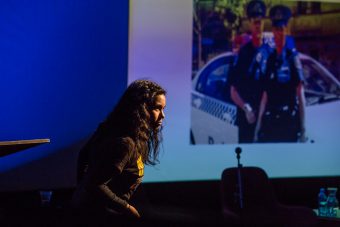
This introduction set the stage for a discussion aimed to position a diversity of voices at the centre of the dialogue, and to conduct this conversation within a paradigm that understood and accepted the subtle and intricate nuances of institutional racism, and its impacts on individuals and broader society.
Panellists, Mariaa Randall and Sethembile Msezane, spoke in turn about their practice and journeys in decolonisation, displacing power, and reasserting identity. Their sentiments demonstrated an actualisation of decolonisation through both language and method.
“I don’t displace Whiteness. I empower Blackness” Randell said, reflecting on the use of cultural communal practices in her work, as well as the importance of retaining control and authority over the messaging and communication around it.
In response, Msezane relayed the experience of racial and political tensions in South African society, and the persistent and stubborn influence of Dutch colonial empire.
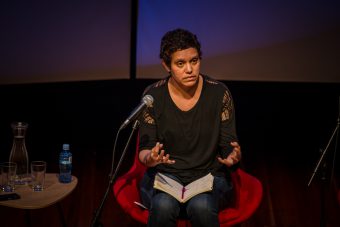
“Displacing Whiteness? I don’t think you can displace Whiteness” She said, Candidly, sharing her experiences in both performance practice and studies: the repeated frictions with her professors inability to understand her frames of reference, and the damage caused when universities become the arbiters of identities for persons of colour (POC).
“It strips you away” Msezane agreed. This statement was met by understanding sighs and nods of head around the room.
Notable in both Randall’s and Msezane’s stories was the tenacious self-assertion necessary in daily interactions with the bureaucracy of arts and academia, in order to resist being co-opted by the dominant paradigm. This bureaucracy, cultivated within racially-biased institutions, tends to inevitably replicate the same discriminations within their administrative, supervisory, and accrediting capacities. As such, discernment is required at every level to augment the curation, reception, comprehension, and acceptance of their work within an institution. Intellectual authority must be claimed, not requested.
Punctuating the perspectives of both Randall and Msezane, Dr Odette Kelada, from the School of Culture and Communication, at The University of Melbourne, offered a necessary institutional perspective on the panel, providing insight into what it means to guide students through the realisation of ‘Whiteness’, and the subsequent inquiry into decolonisation.
Kaleda noted that her students engage in an evolutionary process in this area, delving into the complexity of the decolonisation space, drawing on how historical narratives, and ways of making meaning persistently influence those occupied in the inquiry, and continuing to explore it – rather than just reaching a point understanding deemed ‘good enough’.
Reflecting on this point, Wynne-Jones openly considered her on going personal journey in decolonisation.
“Some of the learning that I’m experiencing as a white woman – in the context of understanding my position of power – is to surface that. To state it, rather than subliminally assume it. I think there’s an element of: unless it is spoken and it is articulated, it is the elephant in the room, and then I don’t have a relationship to it, I’m just working with the power that’s been assigned to me.” She said.
“That feels quite a critical part of moving on and moving through to get somewhere else. It would be a shame if it stayed in that place. I think there are some really clear inequalities in the arts world – in who has the power and who has access to the voice. To being heard, to the resources, and that is a discussion that we should have. It is about being uncomfortable as a white person and feeling like ‘Oh, I’m working really hard, I’ve earned my place and why should I be displaced?’. It’s as important to interrogate my own power and privilege, and even in the asking of the question, it has the potential to shift and disrupt something in an interesting way.
“The displacing whiteness forum is the most popular event of the season so far, so I think people are up for it, because of course, it is ultimately in everyone’s best interest to live in a just and beautifully equal society.”
During the event, the specific question of displacing Whiteness in the arts was only approached peripherally through the panel discussions. The fullness of the dialogue demonstrated, rather, the need for more spaces to discuss the larger project of decolonisation and POC-centred identity-making. Nonetheless, the presence of so many voices in the room, otherwise often-limited in their capacity to be heard in a public arena, was an encouraging sign. Each of these voices brought in new and sometimes divergent perspectives, which was further proof of the potential breadth of discourse existent in this space.
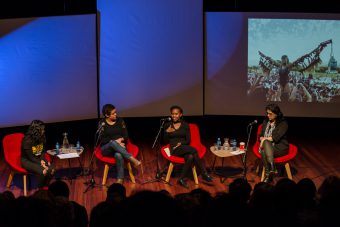
She says this is where the notion of ‘getting out of the way’ comes into play.
“One of the things we talk about at Arts House (as a predominantly white organisation), is how we – as a creative team – can get out of the way of people of colour and other non-dominant identities, so that those voices and experiences can be expressed and heard.
Getting out of the way is also about letting go. You can be pushed aside or you can make space if you have the power.” She said.
“For us, we are in the long-term decolonisation project to make Arts House as malleable, flexible, and permeable as possible so that it has the best chance of supporting someone’s radical vision, leadership and creative practice. To achieve this is a delicate balance of walking towards these energetic ideas, that are necessary and urgent, and at the same time ensuring that the community of artists and audiences that understand issues in different frameworks feel that they have a place in the room and a place at the table.”
Many audience members emerged from the panel with a sense of how much more there was to say on the issue, and it certainly piqued personal reflection. Considering the specific nuances felt by people of various migrant, diasporic, and refugee backgrounds, it was virtually impossible to satiate the various perspectives through the event. But with Arts House joining the list of key institutions taking on such topics, including Footscray Community Arts Centre, and Arts Centre Melbourne, it appears the public momentum is building.
Despite this, Wynne-Jones explains that the Arts sector is still the least culturally diverse sector in Australia.
“That’s a track to redundancy. How can we possibly be telling meaningful cultural narratives of any sort unless that changes? I can’t imagine that that’s not evident to mainstream cultural institutions.” She said.
Wynne-Jones says the biggest challenge faced by Arts organisations in having conversations meaningfully, comes in the form of poor resources.
“Arts House is comparatively well-funded, so the ambition is to keep many conversations happening. That may mean making more room at the table, bringing up more chairs.” She said.
“My fantasy would be that we are able to support a team of culturally diverse curators and a First Nations elders network that can help us create work in this space and make sure we’re ready to address some of the really urgent social problems that we face.”
Those who attended Sunday’s event are, no doubt, watching this space.
The Arts House program continues in August with several of the artists from the July season featuring written and audio work on the Arts House website.
